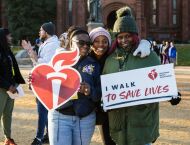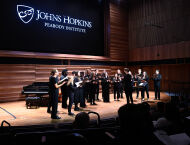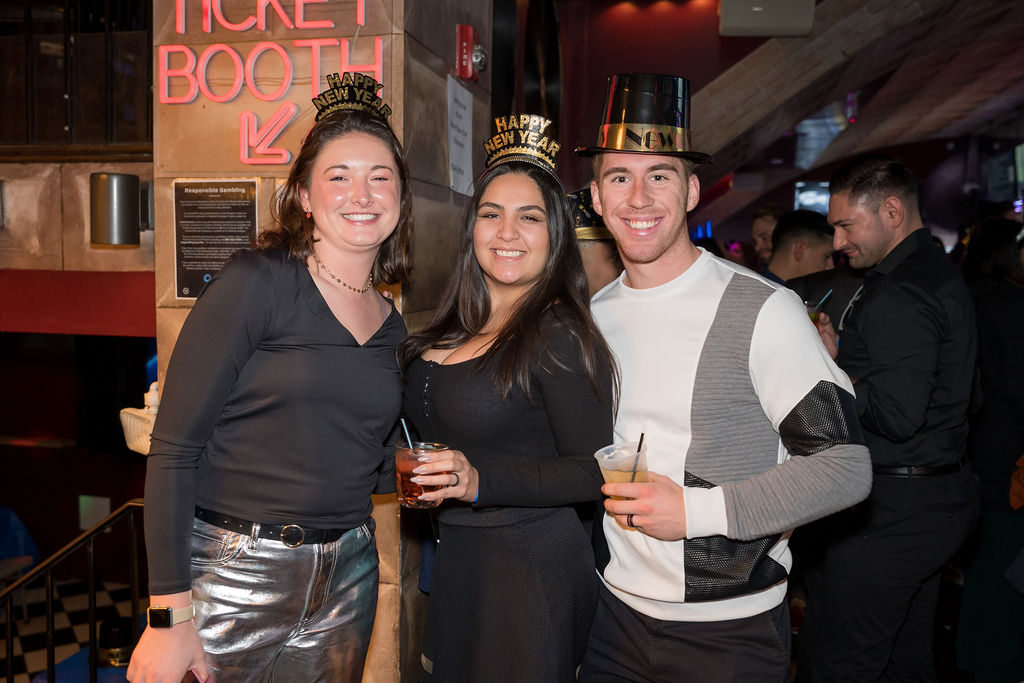Music
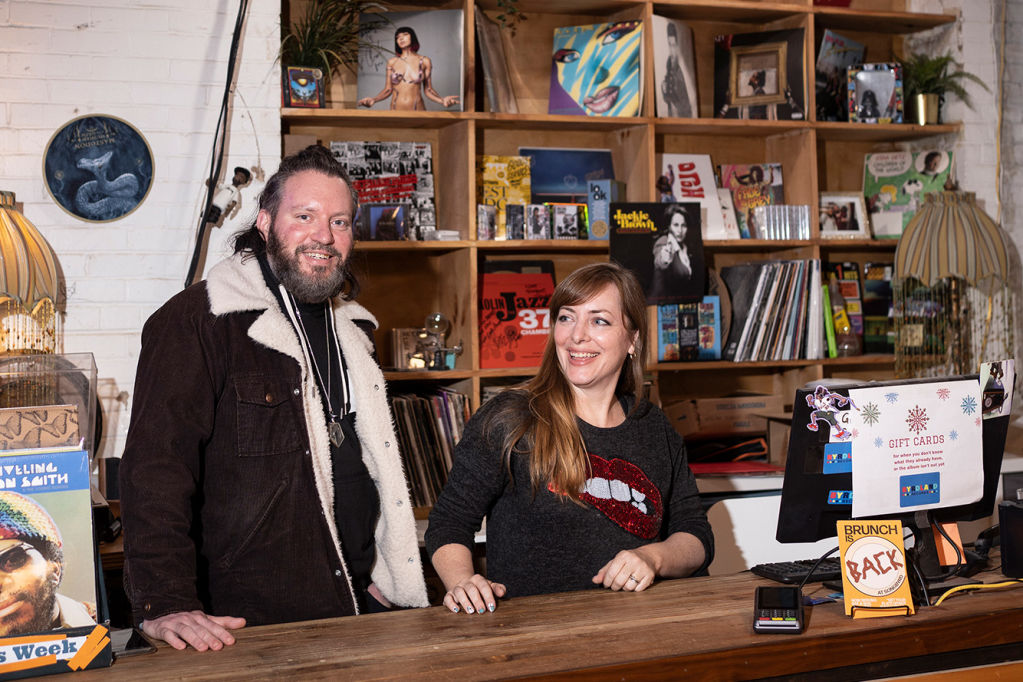 From R to L: Joe Lapan and Alisha Edmondson. Photo by Kimchi Photography.
From R to L: Joe Lapan and Alisha Edmondson. Photo by Kimchi Photography.
The Waxing + Waning of Vinyl: A Chat with Byrdland Records’ Owners
April 1, 2022 @ 9:00am
Alisha Edmondson, co-founder of Byrdland Records and sister location Songbyrd Music House, just had her groceries delivered. Because of the commotion brought about by fresh produce and foods shuffled in the background, she’s speaking to me with her camera off as she and co-founder Joe Lapan recount the story of how their initial location in Adams Morgan came to be.
“Years before we opened [in 2015], I remember telling Joe how lucky we were that we grew up without digital,” Edmondson says, “and that our friends and I had communal experiences with music and it earmarked times in our life.”
I tend to prefer Zoom conversations to phone calls because it allows me to see people’s faces. It helps me answer internal questions such as what makes them smile when talking about themselves — or conversely, what makes them furrow their brows? These nuances often shed light in ways words don’t. However, these subtleties weren’t essential when listening to Edmondson. The passion bled through her voice as she recounted her and Lapan’s initial ideas for founding a music-centric business, including a revelatory experience at a Classic Album Sundays session in Brooklyn, New York.
“We closed our eyes as they re-did the listening experience to how [The Beatles’] ‘Sargent Pepper’ was created — we just listened,” she continues. “I think it kind of brought home this idea we had and solidified how much we liked the concept of going back to listening. How do you translate going back to listening in a physical place? How do we get people to listen in a group setting again?”
In its infancy, Songbyrd Music House and Cafe, a small-ish building in Adams Morgan, and progenitor to Byrdland, housed both a record store and a venue. Think of a Swiss Army knife containing all those little blades and metallic tools within its narrow handle. Songbyrd was like this for the D.C. music scene, only instead of utility knives it combined and celebrated music.
Eventually, and undoubtedly exacerbated by the Covid-19 pandemic, the diverse menu of Songbyrd needed to be split up and separated so each could continue to flourish and grow. This necessity became a driving force behind the duo’s decision to move the business to Union Market, allowing for an open-air, more spacious Songbyrd located a stone’s throw away from its sister storefront Byrdland Records, the record store.
Despite the unavoidable difficulties brought about by moving locations, dealing with Covid restrictions and shifting each shop’s responsibilities, both Edmondson and Lapan have continued to highlight the aspect most important to them: A community of people listening to good music.
View this post on Instagram
Moving, Expanding + Evolving
One of the first questions I asked Edmondson and Lapan was if they felt at home in Union Market. After more than five years in Adams Morgan serving as a huge proponent for neighborhood happenings, the duo opened Byrdland Records in Northeast in late 2020 with Songbyrd moving nearby in late summer 2021.
“I feel like the businesses are very communal,” Edmondson says. “We do collaborations and some of our regulars live over here, too. During the pandemic, people shifted around a little bit. Having Byrdland first, we were able to create relationships over here.”
Lapan agrees, saying Union Market is a little wider and freer than other areas, with less congestion than other parts of the city. For example, Byrdland Records carries more than 5,000 vinyl records and houses turntables, speakers, cartridges and other equipment any vinyl lover would want to have. As for Songbyrd Music House, the venue can host up to 200 people and houses a bar and restaurant. These concepts used to be housed under one roof.
“A lot of time in the city, depending on where you are, you can feel constantly smushed by tight spaces,” he says. “I think Union Market is a relief from that.”
Both say Covid-19 played a factor in their business moving neighborhoods, with things shutting down and opportunities opening up. For the record store component, Lapan says it felt like a core piece of the business that could continue through the pandemic via e-commerce and careful internal planning.
“In Adams Morgan, we were doing everything in one space and for a while, we lived with the fact that half of the business was in one place and the other half was in another,” Lapan says. “I think our objective was always for them to live near one another. That’s an ideal scenario.”
Despite this, Edmondson says there weren’t imminent plans to move Songbyrd — even after the opening of Byrdland. But as time went on and the pandemic persisted, change was necessary in order to optimize safety for customers and attendees.
The pivot was extremely quick and emotional. Despite the best intentions, particularly with safety in mind, moving all of Songbyrd out of Adams Morgan was a difficult process for both Edmondson and Lapan.
“I spent a lot of time in that neighborhood as a younger person and the place meant a lot to me — we put a lot into the community,” Lapan says. “By the time we got to where we got to, it was just a move we needed to make for our business. So, we were at peace with it at that point. The whole journey of being a small business owner is emotional. A lot of the emotion in Adams Morgan was spent across the six years dealing with the older building.”
“We had a short announcement period,” Edmondson adds. “We were doing shows at the old location and then announced the move and moved everything in essentially a week. We have a wonderful team who have been with us for years who helped make it happen.”
Regardless of its physical location, the vibe hasn’t changed. From helping customers identify records worth having to putting on listening parties and celebrating local artists with concerts, Songbyrd and Byrdland have carried on the goals conceived in 2015.
“Obviously, it’s very enjoyable to fulfill [your goals] and have a business where you’re engaging with people around music,” Lapan says. “People are pretty much happy when they come and leave your store. It’s music; it’s the highest expression of being a person.”
Edmonson says the goals for Songbyrd and Byrdland are different now: With Byrdland, it’s about guiding people through starting a record collection and for the venue, she mentions seeing performers persevere with sold-out shows.
“It’s still hard,” she says. “But I think all of those things showed me this was the right move. In December, we could roll up our doors and keep fresh air in; we made the right decision.”
A Bug That Never Left Me
Edmondson grew up with an affinity for vinyl and music, recounting the time when her father cranked Jimi Hendrix after he converted a wine-cooling closet into a sound room. Lapan says his first vinyl memory was more traditional, mentioning the mystique of his parents’ collection and playing records when he wasn’t supposed to.
“I don’t recall engaging with my parents on what to do with records,” Lapan says. “My formative musical experiences were actually more around tapes and CDs with my friends. I’m a kid of the late ’80s and early ’90s. I remember going to the ‘record store’ and trading tapes and CDs.”
Lapan says records have maintained their status for a number of reasons, even saying it’s the king of the physical medium. He cited the durability, sound, size and packaging as primary reasons for its sustainability.
“You’re not going to put tape liner notes on your wall,” he says. “The opportunities for the art and the packaging make it more interesting and collectible. When you’re able to trigger people’s ideas of visible and physical art, you’re able to tap into a whole thing beyond a product which is more about lifestyle, identity and what represents you.”
Edmondson cites the ritual of playing a record. She says the acts of looking through your records, deciding what to play and placing the needle are what’s missing from other music mediums.
Listening to each explain their history and adoration for records wasn’t a surprise since they’re now owners of a thriving record shop in a major metropolitan city. In fact, the initial plan was for the vinyl to be front and center with an adjoining bar area; the live music Songbyrd is now known for wasn’t in the pair’s initial plans.
“Music was a bug that never left me,” Lapan says. “I just remember paying attention to everything, the city and the landscape. When you’re conceiving an actual physical space, you have to map out what you want to do, what are you going to do? We’ve always had an intent to retail records as part of the original concept.”
Despite the growth in popularity of vinyl, Lapan is frank when discussing the finances of running a record business. Like any other small shop, it’s rife with difficulties ranging from pricing to negotiations. Though being on the other side of the counter hasn’t made Lapan or Edmondson “rich,” the two are grateful for what vinyl records have afforded them.
During Covid-19, Edmondson says records became a way for fans to support bands who suffered from an inability to tour. But vinyl became a comfort in other ways during the pandemic.
“To me, changing your record is kind of like walking to your water cooler when you’re working from home,” she says. “I think a lot of people were looking for ways to manage their work balance from home. I know I enjoyed my 23-minute breaks.”
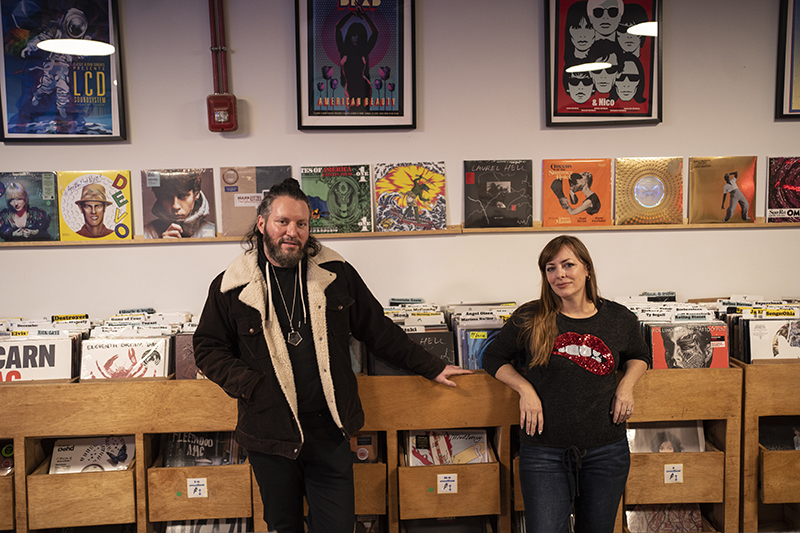
Photo by Kimchi Photography.
Separate But Related
When Songbyrd first shut down due to the restrictions in 2020, Edmondson and Lapan sought a way to connect with the community they helped build through Songbyrd and have grown with Byrdland. At first, it was through collaborations with José Andrés’ World Central Kitchen and in other local initiatives. The two also began operating the Byrdmobile, a truck where musicians would play in the bed of the vehicle outside.
“The first time I cried,” Edmondson says. “Little kids were coming out of their homes with masks on and it was 4th of July with no one doing anything.”
The feeling Edmondson got on that day, where people escaped their homes to enjoy just a sliver of live art, is the goal for moving forward. She wants to foster a sense of community and pride in what can be accomplished locally in the District.
“We want to do parties for local musicians putting vinyl out, clothing pop-ups at Songbyrd, etcetera,” Edmondson says. “I feel like we’re so lucky to still be here, so how do we give back in ways we can. We have space and we have community.”
With D.C. and the federal government loosening restrictions for gatherings and live events, the sister stores may finally be able to use the new facilities with a truly effective synergy.
“There’s a lot of synergies between live music and vinyl that we look to explore and marry,” Lapan says. “Beyond the obvious, we have a ‘Played at Songbyrd Section’ at Byrdland and we carry a ton of local musicians’ music. There are a lot of ways the stores complement each other.”
At the end of the day, Edmondson and Lapan are first and foremost about the music. Not just the aspect of buying and selling or hitting the play button, but active listening.
“You’re engaging with people around music and it’s awesome,” Lapan says. “Getting to be in those moments and with that perspective, seeing the store busy. You get to have some feeling of what it took for you to get there and it’s all very enjoyable.”
Byrdland Records: 1264 5th St. NE, DC; byrdlandrecords.com // @byrdlandrecords
Songbyrd Music House: 540 Penn St. NE, DC; songbyrddc.com // @songbyrddc
Enjoy this piece? Consider becoming a member for access to our premium digital content. Support local journalism and start your membership today.



